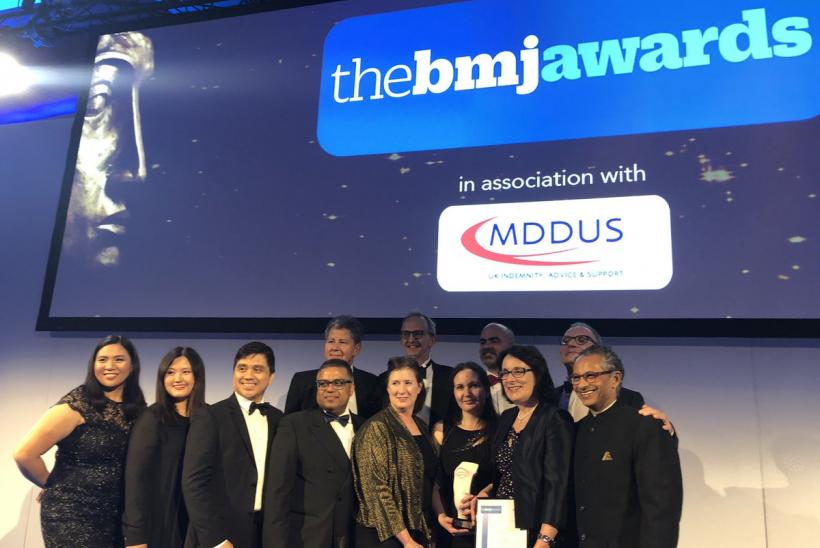Spina bifida team win BMJ award
A team from University College London Hospitals (UCLH), UCL and Great Ormond Street Hospital (GOSH) has won the clinical leadership team award in the BMJ awards, the UK's leading medical awards which promote excellence in healthcare and recognise the inspirational work of healthcare teams across the country.
The UCLH/UCL/GOSH team operates on the abnormally developed spinal cords of babies in the womb, in what are the first surgeries of their kind in the UK. Some of the team were at the Westminster Park Plaza Hotel last night to receive their award.
Before 2018, although fetal surgery was available across North America and in some continental European centres, UK parents interested in this option applied for specialist funding or self-funded the procedure abroad.
Three years ago, a 30-strong team coordinated by fetal medicine consultant Anna David of the UCL Institute for Women’s Health and UCLH, decided to set up the Centre for Prenatal Therapy. “We wanted to offer this service to women and their babies in the UK without them needing to travel abroad. It’s been a resounding success."
"The surgery is complex. There are two patients (mother and baby) requiring a multidisciplinary team involving fetal medicine doctors, midwives, obstetricians, neonatologists, radiologists, anaesthetists, paediatric neurosurgeons and neurosurgical scrub nurses,” said lead fetal surgeon Jan Deprest of UCLH and University Hospitals Leuven.
"Children born with spina bifida are prone to a range of disabilities; many will not walk or have significant weakness in the legs and feet, and over two thirds of children develop ‘water on the brain’ (hydrocephalus) that often requires a series of brain operations during childhood. This specialist fetal surgery does not cure spina bifida but it provides an opportunity to significantly improve the quality of life for these children by reducing the likelihood of hydrocephalus, reversing some of the brain changes associated with hydrocephalus and improving leg function compared to postnatal surgery,” said lead paediatric neurosurgeon Dominic Thompson of GOSH.
The operations were made possible through a training partnership with University Hospitals Leuven in Belgium. Professor Deprest's team in Belgium has conducted more than 40 similar operations, some on English patients from UCLH, since 2012.
The British team has also benefited from close links with the Children’s Hospital of Philadelphia where the team led by N Scott Adzick pioneered this operation and has conducted more than 320 similar operations since 2011.
The team worked with SHINE charity and patients who underwent fetal surgery abroad to optimise the UK service and since launching in 2018, they have already performed five surgeries in the UK and 10 in Leuven.
"The Centre for Prenatal Therapy programme at UCLH and GOSH was made possible thanks to generous charitable funding totalling £450,000 from GOSH Children’s Charity and UCLH Charity”, said Professor Donald Peebles, clinical director of Women’s Health at UCLH.
The team is also keen to start carrying out fetoscopic surgeries. "While we currently only perform an open fetal surgery approach, we are developing a less-invasive fetoscopic technique and we hope this could further minimise maternal side-effects," said Professor Paolo De Coppi of the UCL Great Ormond Street Institute of Child Health.
Research to develop new fetoscopic tools and imaging techniques is part of the GIFT-Surg project which aims to improve fetal surgery, and is funded by the Wellcome Trust and the Engineering and Physical Sciences Research Council (EPSRC).
The NIHR Biomedical Research Centres at GOSH and UCLH support some members of the team.


